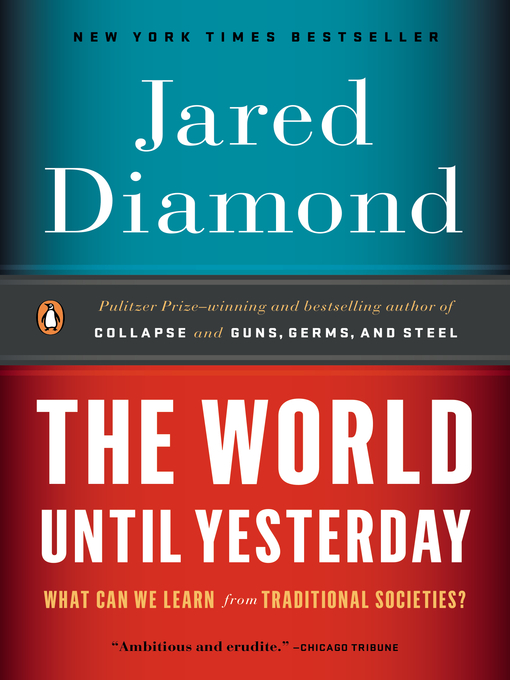
The World Until Yesterday
What Can We Learn from Traditional Societies?
کتاب های مرتبط
- اطلاعات
- نقد و بررسی
- دیدگاه کاربران
نقد و بررسی

September 17, 2012
Lyrical and harrowing, this survey of traditional societies reveals the surprising truth that modern life is a mere snippet in the long narrative of human endeavor. “The hunter-gatherer lifestyle,” the author reminds us, “worked at least tolerably well for the nearly 100,000-year history of behaviorally modern humans.” Renowned for crafting startling theories across vast swaths of time and territory, Pulitzer Prize–winner Diamond (Guns, Germs, and Steel) eschews the grand canvas to offer an empathetic portrait of human survival and adaptability. Drawing examples from Africa, Japan, and the Americas, Diamond details the astonishing diversity of human ideas about religion, warfare, child-rearing, eldercare, and dispute resolution. Most of the data comes from New Guinea, which is home to some of the last primeval peoples on Earth. The author has been conducting fieldwork on the Pacific island for half a century and writes about its cultures and ecology with palpable affection. This book presents a lifetime of distilled experience but offers no simple lessons. Neither the first world nor tribal cultures possesses a monopoly on virtue. The cruelty of such traditional practices as infanticide and revenge killings is offset by the ennui and atomization of modern life. A world without Internet, television, and books, without lawyers, heart attacks, or cancer—for better and worse this was the world until “yesterday.” 16 pages of 4-color insert. Agent: John Brockman.

Starred review from October 15, 2012
A supple and engaged journey into traditional societies and an exploration of their ways of life, from the Pulitzer Prize-winning author of Guns, Germs, and Steel (1997). As Diamond writes (Geography/UCLA; Collapse: How Societies Choose to Fail or Succeed, 2004, etc.), traditional societies--those that retain features of how our ancestors lived for tens of thousands of years, with low population densities in small groups, subsisting on hunting-gathering, farming or herding, with little transformative contact with industrial societies--hold a fascination to many of us. They provide a window into how society used to be fashioned and how we have found, or not, solutions to human problems. Diamond's investigation of a selection of traditional societies, and within them a selection of how they contend with various issues--dispute resolution, child rearing, treatment of the elderly, alertness to dangers, etc.--is leisurely but not complacent, informed but not claiming omniscience. As he notes, the range and complexity of traditional societies does not permit easy generalizations. The author compares these societies with our "state" societies to see where their attributes shine more favorably. He is unafraid of making some sweeping suggestions--"Increases in political centralization and social stratification were driven by increases in human population densities, driven in turn by the rise and intensification of food production (agriculture and herding)"--while also examining the dozens of other factors involved. Diamond's experience with traditional societies has opened him to certain aspects that we might adopt to our benefit, including multilingualism, the importance of lifelong social bonds, nursing and physical contact with children, constructive paranoia and the significance of the aged. A symphonic yet unromantic portrait of traditional societies and the often stirring lessons they offer.
COPYRIGHT(2012) Kirkus Reviews, ALL RIGHTS RESERVED.

August 1, 2012
The Pulitzer Prize-winning author of Guns, Germs, and Steel addresses not what separates us from traditional societies but what connects us, e.g., childcare and health. Drawing on his work with Pacific Islanders, as well as studies of Inuit, Amazonian Indian, Kalahari San, and other cultures, Diamond argues that traditional societies have much to teach, even if we do not accept all their practices. With a 12-city tour.
Copyright 2012 Library Journal, LLC Used with permission.

October 1, 2012
In the broader scope of evolution, it was only yesterday 11,000 years ago when we progressed from hunter-gatherer groups to modern states. Along the way, we've changed the ways we resolve disputes, raise children, care for the old, practice faith, nourish ourselves, communicate, and a host of other mundane and monumental human activities. Diamond, author of the highly acclaimed Guns, Germs, and Steel (1999) and Collapse (2005), offers a penetrating look at the ways we have evolved by comparing practices of traditional societies and modern and industrialized societies. Diamond draws on his fieldwork in New Guinea, the Amazon, Kalahari, and other areas to compare the best and most questionable customs and practices of societies past and present. Diamond does not idealize traditional societies, with smaller populations and more interest in maintaining group harmony than modern societies organized by governments seeking to maintain order, but he does emphasize troubling trends in declining health and fitness as industrialization has spread to newly developing nations. In this fascinating book, Diamond brings fresh perspective to historic and contemporary ways of life with an eye toward those that are likely to enhance our future. HIGH-DEMAND BACKSTORY: Publicity and television and media appearances will be full-throttle for Diamond, an acclaimed scholar and best-selling writer and opinion-shaper.(Reprinted with permission of Booklist, copyright 2012, American Library Association.)

























دیدگاه کاربران